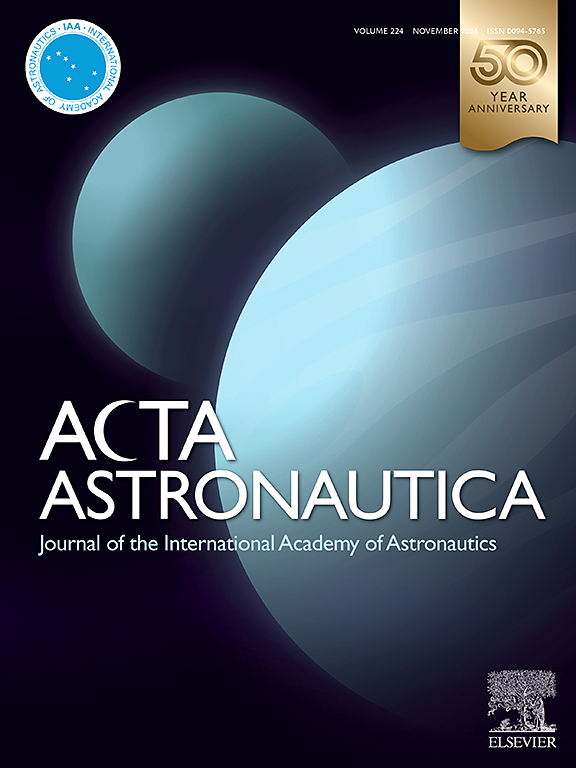Space tourism marketing management considerations: locating in tourism spectrums, measuring motivated consumer innovativeness via moderating role of perceived risks, and challenging in environment
IF 3.4
2区 物理与天体物理
Q1 ENGINEERING, AEROSPACE
引用次数: 0
Abstract
The emerging space tourism has entered the pilot run phase. For the marketing management, there are still many considerations beyond the technology advancement. This study explores three aspects including its location in the tourism spectrums, consumer innovativeness via moderating role of perceived risks in space tourism, and potential challenging in environment. There are many spectrums in tourisms: lightness-darkness, cost, technology, adventure, comfort, popularity, safety and risk, etc. At this emerging pilot run phase, the space tourism has its high ends, i.e., high cost, high technology and high adventure, as well as its low ends, i.e., relatively low comfort and low popularity. Considering its extremely high cost at the current time, high-end tourists are particularly of interest in this study. For the impact of motivated consumer innovativeness (MCI) on perceived risk and word-of-mouth (WoM) communication about space tourism and its countermeasure considerations, perceived risk is the potential feeling of the tourist customer. A total of 313 valid questionnaires representing a 91.7 % response rate were collected through an online questionnaire survey. This research used multiple regression to examine the influence of MCI on positive WoM and the moderating role perceived risk plays in the relationships. The findings indicate that MCI is associated with improved consumer-positive WoM. The results also show that perceived risk moderates the relationship between MCI and WoM. Besides, potential risks of space tourism on the global environment due to the increases in rocket launch emissions and space debris are also studied as the third aspect.
空间旅游营销管理考虑:定位于旅游频谱,通过感知风险的调节作用来衡量消费者的创新动机,以及环境挑战
新兴的太空旅游已进入试运行阶段。对于营销管理来说,除了技术进步之外,还有很多需要考虑的因素。本研究从三个方面探讨了空间旅游在旅游频谱中的位置、消费者在空间旅游感知风险的调节作用下的创新能力以及潜在的环境挑战。旅游有很多方面:光明-黑暗、成本、技术、冒险、舒适、流行、安全和风险等。在这个刚刚起步的试运行阶段,太空旅游既有高成本、高技术、高冒险的高端,也有相对较低舒适度、低人气的低端。考虑到目前它的成本非常高,高端游客对这项研究特别感兴趣。对于消费者创新动机对空间旅游感知风险和口碑传播的影响及其对策考虑,感知风险是游客顾客的潜在感受。通过网络问卷调查,共收集有效问卷313份,回复率91.7%。本研究采用多元回归分析方法,探讨认知风险对认知自我认知的影响以及认知风险对认知自我认知的调节作用。研究结果表明,轻度认知障碍与改善的消费者积极口碑有关。结果还表明,感知风险调节了MCI和WoM之间的关系。此外,第三方面还研究了由于火箭发射排放和空间碎片的增加而导致的太空旅游对全球环境的潜在风险。
本文章由计算机程序翻译,如有差异,请以英文原文为准。
求助全文
约1分钟内获得全文
求助全文
来源期刊

Acta Astronautica
工程技术-工程:宇航
CiteScore
7.20
自引率
22.90%
发文量
599
审稿时长
53 days
期刊介绍:
Acta Astronautica is sponsored by the International Academy of Astronautics. Content is based on original contributions in all fields of basic, engineering, life and social space sciences and of space technology related to:
The peaceful scientific exploration of space,
Its exploitation for human welfare and progress,
Conception, design, development and operation of space-borne and Earth-based systems,
In addition to regular issues, the journal publishes selected proceedings of the annual International Astronautical Congress (IAC), transactions of the IAA and special issues on topics of current interest, such as microgravity, space station technology, geostationary orbits, and space economics. Other subject areas include satellite technology, space transportation and communications, space energy, power and propulsion, astrodynamics, extraterrestrial intelligence and Earth observations.
 求助内容:
求助内容: 应助结果提醒方式:
应助结果提醒方式:


